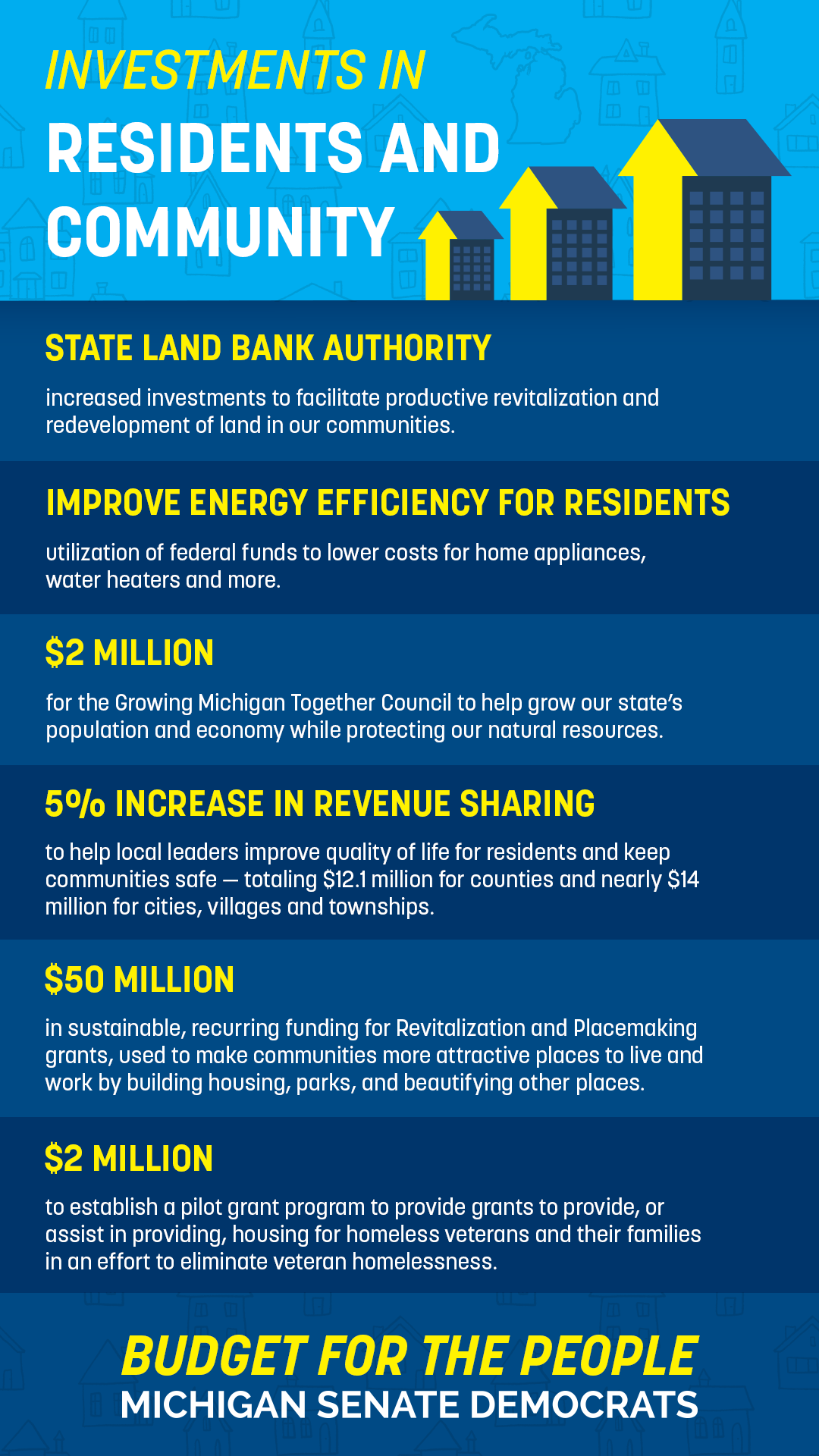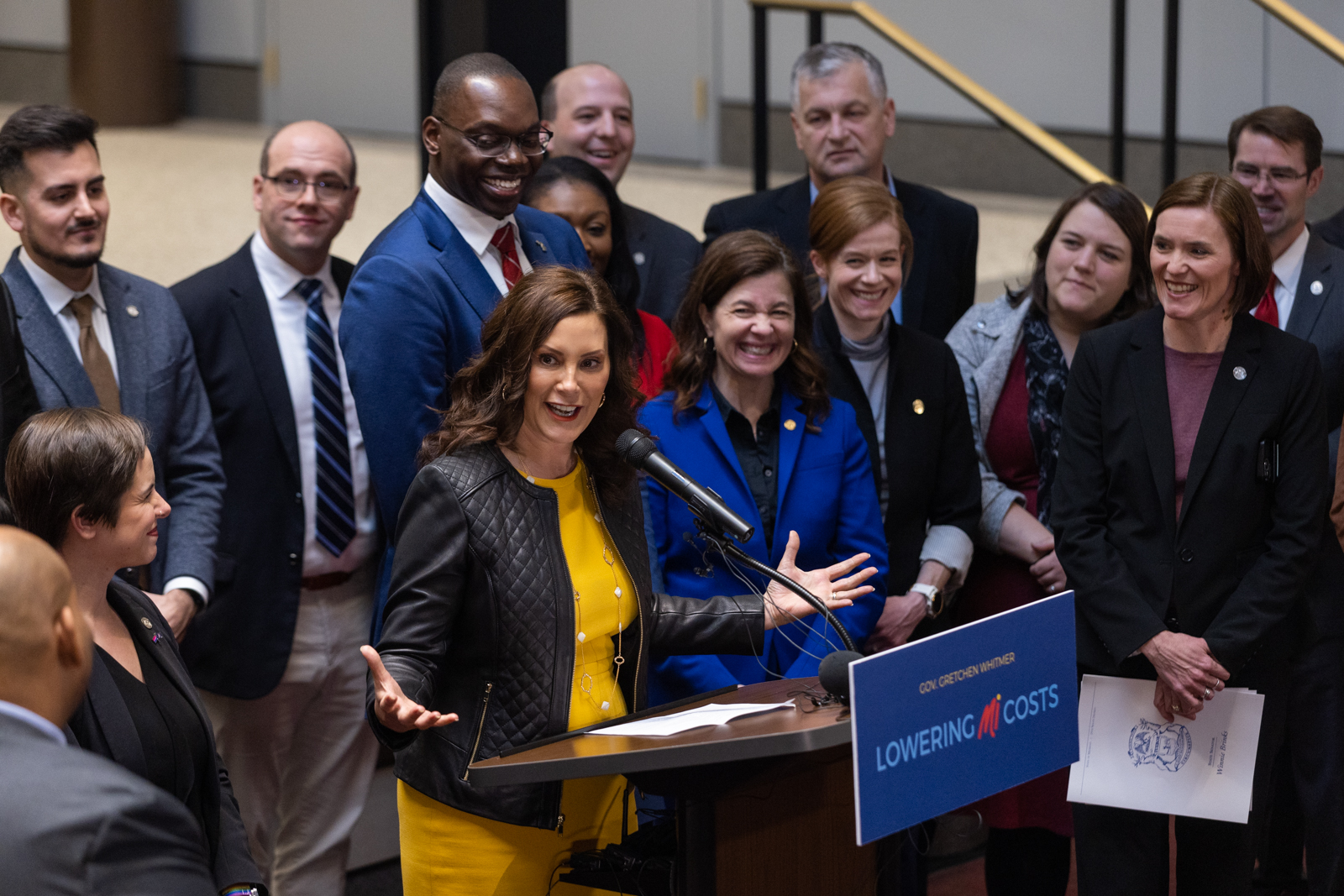Importance of 2023 budget and policy wins for housing underscored by winter weather, holiday season
Safe and affordable housing continues to be a critical need for Michiganders — and a top priority for the Michigan Senate Democrats’ #MajorityForThePeople. Like the song says, “there’s no place like home for the holidays,” and over the past year, Senate Democrats have been working hard on a number of fronts to help Michigan residents find and keep quality housing at an affordable cost.
In an interview with Gander Newsroom, Senate Majority Leader Winnie Brinks (D-Grand Rapids) talks about her desire to ensure everyone has a safe place to call home. Click here to watch the full interview.
Affordable housing is in too short supply across Michigan. High interest rates and home prices create challenging conditions for both buyers and sellers. Many Michigan renters face challenges finding affordable housing too, with over half spending more than 30% of their household income on housing expenses. Due to the high cost of rent, families often have to forgo food, healthcare or other necessities to avoid eviction. Through investments in affordable housing and community development, passing historic tax relief and incentivizing redevelopment projects — Senate Democrats have been working to change this reality and expand access to affordable housing.
Budget Investments
Jan. 31, 2023: Senate Bill 7, legislation sponsored by Senate Appropriations Chair Sarah Anthony (D-Lansing), was signed into law to provide funding for a number of important priorities, including housing. This supplemental budget funding included:
- $150 million to reduce the housing cost burden of residents and preserve existing affordable housing;
- $100 million for investment in Community Revitalization & Placemaking (RAP) projects to rehab vacant properties and develop place-based infrastructure associated with social zones and traditional downtowns;
- $75 million for blight elimination, including demolition of properties, stabilization of properties for future rehab, environmental remediation, rehabilitation and project administration; and
- $50 million to increase the supply of housing stock for construction or rehabbing of properties targeted to “missing middle” households.
“Michiganders have been calling for investments to be made in a variety of programs and institutions for decades, and this new majority has shown a strong dedication to listening to those calls and getting the work done,” said Sen. Anthony following the bill’s signing. “It’s time we worked to provide residents with tangible change as soon as possible, because keeping folks in their jobs, homes and small businesses is where our priorities are.”
June 28, 2023: The Senate Democrats passed their transformative ‘”budget for the people” to tackle the pressing needs of Michigan kids, workers and communities. The budget included significant investments in infrastructure, including one-time funding for the most critical road and bridge projects across the state, as well as support for improved transportation, water and environmental systems — plus transformative community investments in housing, municipal needs and more.

“From the very beginning of our Majority for the People, we knew we wanted a budget focused on making it easier to raise a family, promoting safe and thriving neighborhoods, helping folks earn a decent paycheck while keeping more of it in their pocket at the end of the month and ensuring we can keep prioritizing the things that matter most to us here in Michigan,” said Senate Majority Leader Winnie Brinks (D-Grand Rapids). “This budget will result in transformative improvements in our communities and I’m incredibly proud that we have gotten it across the finish line with bipartisan support.”
Lowering MI Costs Plan
Feb. 28, 2023: The Senate Democratic Majority finalized the Lowering MI Costs Plan, which included $1 billion in historic tax relief for Michigan residents by eliminating the unfair and unpopular retirement tax, expanding the Working Families Tax Credit to 30% (from 6%) and making significant investments in housing and community development. As the plan name indicates, these major tax changes were intended to lower costs for Michiganders, especially those struggling to make ends meet, and make it easier for people to pay their rent, mortgage and utility bills.

Hitting the ground running in their first month in office, Senate Democrats join Gov. Gretchen Whitmer to announce the Lowering MI Costs plan — the largest tax relief plan Michigan has seen in decades.
But the Lowering MI Costs Plan also included a direct investment of $50 million of surplus tax revenue in the state’s Housing and Community Development Fund, which prioritizes projects offering veterans, seniors, people with disabilities and working families safe, affordable places to call home. This is significant, sustainable and ongoing dedicated funding to affordable housing — the first permanent funding for affordable housing and community revitalization in state history.
The plan also provides $50 million for Revitalization and Placemaking (RAP) grants to turn underutilized office, commercial or community space into places for people to enjoy, including affordable housing, parks, outdoor dining spaces, community gathering places and more.
“This historic legislation tackles longstanding Democratic policies to provide significant support to our fellow Michiganders who need it the most. Lowering MI Costs also makes key investments in housing, parks, community spaces and other pieces of a holistic, reenvisioned approach to economic development,” said Sen. Mallory McMorrow (D-Royal Oak).
“Missing Middle” Housing Needs
June 28, 2023: The Michigan Senate passed bipartisan legislation to increase the state’s middle-income housing supply by expanding Michigan State Housing Development Authority (MSHDA) eligibility to include middle-income households. Sen. Kristen McDonald Rivet (D-Bay City) sponsored Senate Bill 293, which expands the Michigan Housing and Community Development Fund (HCDF) by making its financing available to middle-income households and providing state and regional housing authorities greater flexibility to address “missing middle” housing needs. The bill is currently before the Michigan House of Representatives for further consideration.
“Affordable housing is often the first thing I hear about in conversations with people in our community,” said Sen. McDonald Rivet. “The new jobs coming to Michigan and our region are great, but we also need to invest in housing for working families. The Community Housing Development Fund changes are good steps forward in addressing our state’s labor supply challenges, growing our population and giving families a sense of stability.”
Increased Housing Through Brownfield Redevelopment
July 18, 2023: The governor signed into law a number of Senate bills to build more affordable housing and transform underutilized or abandoned property into productive space. Senate Bills 129–132 are sponsored by Senate Majority Floor Leader Sam Singh (D-East Lansing), Sen. Kristen McDonald Rivet, Sen. Mary Cavanagh (D-Redford Twp.) and Sen. Sue Shink (D-Northfield Township). The legislation expands access to affordable housing by incentivizing the redevelopment of brownfield properties for housing units and making it easier and more economical to build affordable housing in Michigan.
“Affordable housing is a national crisis, and Michigan is no exception,” said Sen. Singh. “It’s critical we take action to address the needs of residents in communities across the state to ensure they have access to stable and affordable housing. These bills will give our local communities more tools, and incentive to invest in affordable housing projects, signaling the commitment to addressing this crisis head-on.”
This legislation is a creative, yet practical approach to addressing the issue of housing affordability, enabling housing projects to receive financial support for redeveloping vacant, obsolete land. Once implemented, Michigan will be the second state in the nation using this innovative approach to boost community revitalization and expand affordable housing.
The governor also signed Senate Bill 289 to establish the Transformational Brownfield Fund to help convert underutilized, vacant or abandoned property in communities across Michigan into productive space ready for business investment and community revitalization projects.
“There is no other program designed for, or capable of, supporting brownfield redevelopments of this scale and impact, putting obsolete vacant land back to proper use,” said Sen. Jeremy Moss (D-Southfield), sponsor of SB 289. “It’s a tool that will help keep and attract talent here, grow our population and create the kind of vibrant locations that people want to live in — while retaining the local input and control that communities are looking for.”
Preventing Housing Discrimination Based on Source of Income
Oct. 11, 2023: The Senate Democrats passed Senate Bills 205–207, a package of legislation sponsored by Sens. Jeff Irwin (D-Ann Arbor), Rosemary Bayer (D-West Bloomfield) and Mary Cavanagh. This legislation will ensure equal access to housing for veterans, people living with disabilities and those receiving other forms of assistance by eliminating source-of-income discrimination in Michigan. The bills have been assigned to the Michigan House of Representatives’ Judiciary Committee.
Together, these bills prohibit landlords from discriminating against a tenant or prospective tenant based on the source of their income. Source of income includes child support as well as benefits or subsidy programs, including housing assistance, public assistance, emergency rental assistance, veterans’ benefits, Social Security, Supplemental Security Income or other retirement programs, and other programs administered by any federal, state, local or nonprofit entity.
Landlords can’t deny renters with Section 8 vouchers | Crain’s Detroit Business (crainsdetroit.com)
“For the holidays, you can’t beat home sweet home.” But for too many Michiganders, finding affordable housing is still a significant challenge. Senate Democrats have worked hard in 2023 to tackle this need head on and pursue innovative, diverse and pragmatic solutions to make it easier for people to find and keep a place to call home. In 2024, our caucus will keep working for you and the good of our entire state to reduce homelessness and increase housing access and affordability for all.
